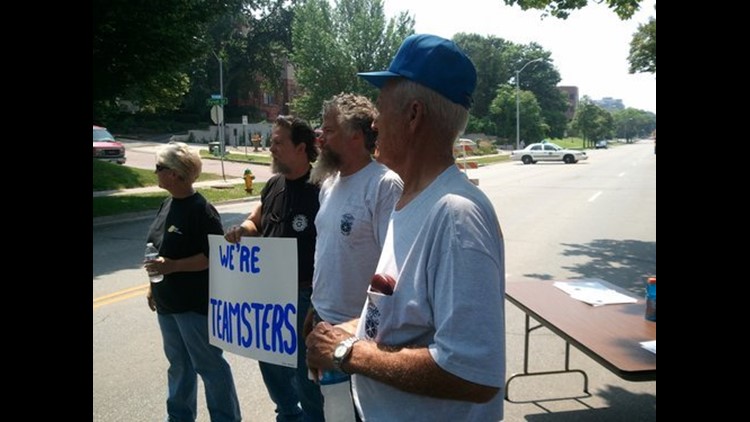DES MOINES, Iowa (AP) — A round of elections in Iowa this month will ask thousands of public sector workers whether they want to dismantle their unions, marking another test of labor strength in Iowa since passage of a law that eliminated most of their collective bargaining rights.
The elections, scheduled over a two-week period beginning Tuesday, will involve about 34,000 workers employed in city and county government, education, law enforcement and other areas. Their votes via phone or website will determine the future of more than 475 bargaining units, making up a significant percentage of Iowa’s roughly 1,200 units that represent about 120,000 public workers.
Jesse Case, the top official for Teamsters Local 238, said about 2,200 of the unit’s 4,000 public workers are eligible to vote this month. Case said the unit, which includes law enforcement officers, educators and county road crews, wants to send a message that public unions remain strong.
“Their vote in the next two weeks is the first step in fighting back,” he said.
The votes are required under a provision of a collective bargaining law approved in February by the Legislature’s Republican majority. Unions now must hold so-called recertification elections before each new contract, which happens every few years depending on the unit.
Union leaders contend the new requirements are intended to weaken workers’ rights, noting those who don’t participate are counted as no votes and that if a unit loses recertification, workers can’t unionize again for two years.
GOP lawmakers argued the law and its various provisions would ensure greater accountability from unions.
Republican Sen. Jason Schultz said many public workers didn’t have a role in forming unions decades ago and that the recertification process allowed them to gain control.
“The goal wasn’t to weaken unions, it was to give workers a voice,” said Schultz, who leads a Senate labor committee and helped write the collective bargaining law. “To let them say, ‘Yes, we want the union, or not.’ And to vote on which representation they would like to have.”
Since Wisconsin enacted a similar law in 2011, membership in both public and private unions has dropped.
Tammy Wawro, president of the Iowa State Education Association, helped with outreach last month when more than 1,100 public school and community college workers voted overwhelmingly to stay unionized.
Speaking as she drove to a meeting with educators in southeast Iowa, Wawro noted that despite the winning vote, the election had eaten up time and money that could have been focused on other matters.
“They’re busy,” she said of teachers who make up many of the 34,000 school employees represented by the association. “They just want to work on what they need to work on to get ready the next day for their kids. And instead, this law has caused a disruption.”
Danny Homan, president of the American Federation of State, County and Municipal Employees Iowa Council 61, said he’s concerned about the logistics of the elections, which will be held online and by phone through a third-party vendor. The recertification elections in September were by mail-in ballot.
Homan, whose union is the state’s largest with roughly 40,000 members, suggested hypothetical situations where someone could fraudulently vote by logging in on behalf of a worker.
“Where’s the check and balance that is supposed to be there to mean that these elections are run with a sense of integrity?” he asked.
The vendor, California-based Everyone Counts, highlights on its website its elections technology and work for government agencies in several states. A company spokesman said via email that it does not comment on its clients or its elections. He directed inquiries to the Iowa Public Employment Relations Board, which oversees bargaining units and selected the company through a bidding process.
Board chairman Mike Cormack said the electronic voting method made sense because of the large scope of the elections. He noted his office has traveled across the state over several months to ensure workers and employers know about the elections. He said the process will be efficient, fair and transparent, and people will have a chance after elections to present any objections about the results.
“We are the vote counters. We have no dog in this fight,” he said. “We have no interest if these all pass. We have no interest if these all fail, or anywhere in between.”
Other issues remain unclear.
Both ISEA and AFSCME have filed lawsuits challenging the constitutionality of the collective bargaining law, and those cases are pending. Separately, union leaders have questioned the Public Employment Relations Board’s interpretation that an existing worker contract becomes void if a union local doesn’t win recertification. The issue could lead to additional legal challenges, since such a contract is supposed to be in effect for several more months.



